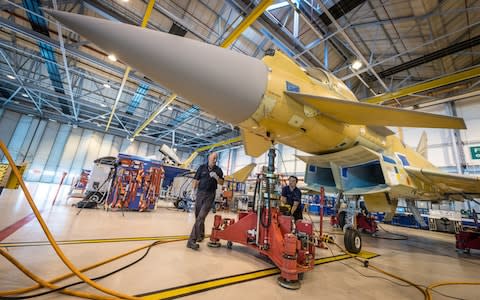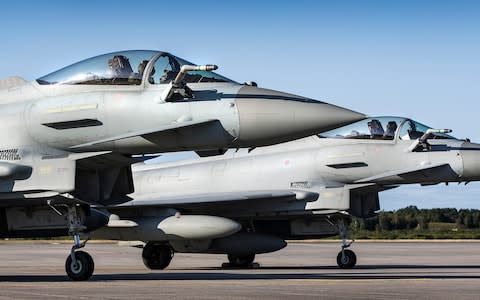BAE lands £5bn Typhoon sale to Qatar, but how will it affect future deals?

Defence group BAE Systems’ shares jumped in early trading as investors reacted to a long-awaited export sale of the company’s Typhoon jet fighters.
BAE shares rose almost 3pc after a £5bn sale of 24 of jets along with a training and support package to Gulf nation Qatar was announced on Sunday afternoon. BAE, Airbus and Italy's Leonardo each have a one-third share in the Typhoon programme.
The deal also threw a lifeline to BAE’s programme building the Hawk training jet - the aircraft flown by the Red Arrows - whose production line is running out of orders.
BAE Systems share price
Qatar’s purchase also included an agreement for weapons manufacturer MBDA - which is jointly owned by BAE, Airbus and Leonardo - for Brimstone and Meteor missiles.
Leonardo also builds the radar and defensive electronics for the Typhoon at its plants in the Luton and Edinburgh, so the sale will be a further boost to the UK.
Combined, the aircraft, weapons, training and support is valued at about £6bn, according to the joint UK-Qatar announcement.
Charles Woodburn, chief executive of BAE, said: “We are delighted to begin a new chapter in the development of a long-term relationship with the State of Qatar and the Qatar Armed Forces, and we look forward to working alongside our customer as they continue to develop their military capability.”
Selling the aircraft to Qatar will “support thousands of British manufacturing jobs”, said Defence Secretary Gavin Williamson, who oversaw the signing to the agreement in Doha.

While the sale is the biggest export order for Typhoons in a decade, it comes too late for almost 2,000 BAE staff.
In October the company said it would be slashing almost 7pc of its headcount - mainly in its military air business, which makes Typhoons - to reduce costs and keep the jet’s production line running because of poor sales. Two years ago the company laid off several hundred staff and slowed the production rate as orders stalled.
The deal came as global weapons sales broke a five-year downturn, according to the Stockholm International Peace Research Institute’s (Sipri) annual survey. Sipri said that sales by the 100 biggest defence companies in 2016 rose 1.9pc to $374.8bn.
BAE’s sale of Typhoons - which will be built at the company's Lancashire base - will relieve some pressure on the company, which has not sealed an order for the jets in two years.

The Qatar deal was flagged with a letter of intent to make the purchase in September, but there were doubts whether it would be completed.
FTSE 100-listed BAE’s announcement of the sale also hinted at caution, noting “the contract is subject to financing conditions and receipt by the company of first payment, which are expected to be fulfilled no later than mid-2018”.
Berenberg analysts have said that Qatar buying Typhoons was not out of military necessity, but instead about strengthening the country’s political ties with the West as it faces troubles closer to home.
Much of Qatar’s wealth comes from being one of the world’s largest exporters of liquefied natural gas, and the proceeds from this are used to invest internationally. Qatar is a leading investor in the UK, where it has sunk more than £40bn into assets including stakes in Canary Wharf, the Shard, and Harrods.

However, Qatar faces problems closer to home. Several of the country's neighbours - including Saudi Arabia, the United Arab Emirates and Bahrain - have severed diplomatic and trade ties with the country, claiming it supports terrorism and criticising its relationship with Iran.
Other recent defence deals highlight Qatar’s attempts to build relationships with the West. In the past year the small nation has agreed to spend $20bn building up its air force, buying F-15 jets from the US and Rafales from France.
Such a mix of types of aircraft in a relatively small fleet will ramp up training and maintenance costs as pilots and engineers have to learn different systems and a larger stock of spares is required, compared with having a single design of fighter. Typically a small air force would focus on a single type to keep costs down. Qatar’s air force currently has just over a dozen fast jets but the Typhoon, Rafale and F-15 orders will take it to more than 100 fighters.
Mr Williamson’s announcement of the sale referred to links between Qatar and the UK, describing the nations as “sharing a close and longstanding defence relationship”.
It added: “The two countries share mutual interests of countering violent extremism, and ensuring stability in the region, and this purchase will deepen those ties by helping to prevent terrorism from spreading and protecting our prosperity and security at home.”
The RAF has been on joint exercises with Qatar’s air force recently, the Defence Secretary said, a practice likely to continue as the defence deal develops, with Qatari pilots and ground crew likely to train in the UK.
How the sale will affect hopes of a long-awaited second order for Typhoons from Saudi Arabia remains to be seen. BAE had its biggest export success with the jet in 2007 when Riyadh agreed a £20bn deal to buy 72 of them in 2007.
BAE has long been waiting for a follow-up order but this has yet to materialise despite a prolonged sales campaign.
A second sale has been hit by several factors, including increasing competition from rival manufacturers, development of newer aircraft with advanced stealth technology, as well as political hurdles.

Defence deals with Saudi Arabia were in the headlines in the summer when the Campaign Against Arms Trade argued that sales licences should be revoked. The campaigners lost a high a profile judicial review when it was ruled the weapons licences did not constitute a risk of breaking international law, but the furore it created put Saudi Arabia’s use of weapons in Yemen in the spotlight.
In October, then Defence Secretary Sir Michael Fallon said he was “personally involved” in sales negotiations with Riyadh but that a deal was being hampered by criticism of Saudi Arabia by MPs.
Speaking to the Defence Select Committee, Sir Michael said aircraft such as the Typhoon were the “shop window” for for Britain’s aerospace industry and export sales were vital to supporting the struggling sector. However, he added: “Sadly, I have to repeat to this committee that criticism of Saudi Arabia in this Parliament is not helpful and I will leave it there.”

 Yahoo Finance
Yahoo Finance 